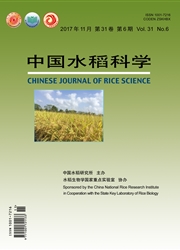

 中文摘要:
中文摘要:
对由pCB6.3kb、pCB5.3kb和pZH01-2.72kb三个不同表达载体转化的转稻瘟病抗性基因Pbd2水稻株系进行稻瘟病抗性分析。结果表明.转Pi-d2基因水稻的9个高代株系对来自四川的39个稻瘟病菌株表现不同的抗性,抗病频率最高达91.7%;4个转基因早代纯合株系对来自中国农业科学院的58个菌株中的81.48%以上菌株表现抗性,具有广谱抗性特点。稻瘟病菌粗毒素筛选结果表明.来自转基因植株的幼胚愈伤组织诱导率随培养基中粗毒素浓度提高而降低,粗毒素浓度达到40%时,幼胚愈伤诱导率为19.33%.受体对照幼胚愈伤组织诱导率为5%。田间诱发条件下,转基因株系在大田的穗瘟发病率为0%~50%,抗性较受体对照大幅度提高。
 英文摘要:
英文摘要:
Transgenic rice lines harboring Pi-d2 gene under the control of different promoters from three expression vector pCB6.3kb, pCB5.3kb and pZH01-2.72kh were tested for resistance to Magnaporthegrisea. The results showed that 9 stably transgenic lines had different resistances to 39 strains of M. grisea from Sichuan Province, China, and the highest disease- resislance frequency was 91.7 %. Four early homozygous transgenic lines of Pi-d2 gene exhibited resistance to more than 81.4894 of 58 strains from Chinese Academy of Agricultural Sciences, which indicates that the transgenic rice lines possessed wide-spectrum resistance against various rice blast races. The results of transgenie embryonic callus selected by crude toxin showed that the induction rate of embryonic callus reduced by increased concentration of toxin in medium. When the toxin concentration was 40% in medium, the induction rate of embryonic callus of transgenic plant was 49.33%, while that of the rceeptor control was 5%;. The disease incidence of neck blast were 0% to 50% in the transgenic lines under induction of rice blast disease in fields, showing the higher resistance to rice blast than that of receptor control.
 同期刊论文项目
同期刊论文项目
 同项目期刊论文
同项目期刊论文
 期刊信息
期刊信息
